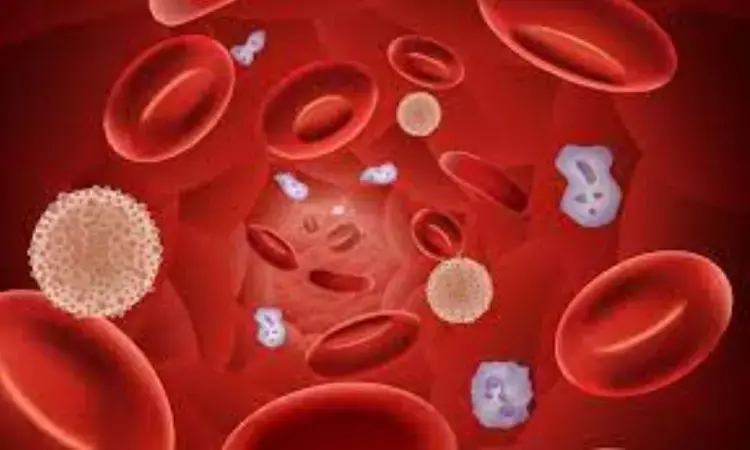- Home
- Medical news & Guidelines
- Anesthesiology
- Cardiology and CTVS
- Critical Care
- Dentistry
- Dermatology
- Diabetes and Endocrinology
- ENT
- Gastroenterology
- Medicine
- Nephrology
- Neurology
- Obstretics-Gynaecology
- Oncology
- Ophthalmology
- Orthopaedics
- Pediatrics-Neonatology
- Psychiatry
- Pulmonology
- Radiology
- Surgery
- Urology
- Laboratory Medicine
- Diet
- Nursing
- Paramedical
- Physiotherapy
- Health news
- Fact Check
- Bone Health Fact Check
- Brain Health Fact Check
- Cancer Related Fact Check
- Child Care Fact Check
- Dental and oral health fact check
- Diabetes and metabolic health fact check
- Diet and Nutrition Fact Check
- Eye and ENT Care Fact Check
- Fitness fact check
- Gut health fact check
- Heart health fact check
- Kidney health fact check
- Medical education fact check
- Men's health fact check
- Respiratory fact check
- Skin and hair care fact check
- Vaccine and Immunization fact check
- Women's health fact check
- AYUSH
- State News
- Andaman and Nicobar Islands
- Andhra Pradesh
- Arunachal Pradesh
- Assam
- Bihar
- Chandigarh
- Chattisgarh
- Dadra and Nagar Haveli
- Daman and Diu
- Delhi
- Goa
- Gujarat
- Haryana
- Himachal Pradesh
- Jammu & Kashmir
- Jharkhand
- Karnataka
- Kerala
- Ladakh
- Lakshadweep
- Madhya Pradesh
- Maharashtra
- Manipur
- Meghalaya
- Mizoram
- Nagaland
- Odisha
- Puducherry
- Punjab
- Rajasthan
- Sikkim
- Tamil Nadu
- Telangana
- Tripura
- Uttar Pradesh
- Uttrakhand
- West Bengal
- Medical Education
- Industry
Bentracimab effectively reduces antiplatelet effects of ticagrelor: REVERSE-IT

USA: Patients undergoing surgery and those with major bleeding when given Bentracimab (PhaseBio), an intravenous reversal agent for ticagrelor, reversed the antiplatelet effects of the P2Y12 inhibitor in more than 90% of patients, show results from a phase 3 trial. The results from the prespecified interim analysis of the REVERSE-IT study were presented at the 2021 American Heart Association (AHA) Scientific Sessions.
The results are significant as bleeding is a risk with all antiplatelet drugs. Their effects become problematic when patients need surgery or suffer a traumatic injury. In such cases, a fast-acting reversal agent would make the drug safer to use.
Ticagrelor is an oral P2Y12 inhibitor sold as Brilinta by AstraZeneca is approved by FDA to treat patients with acute coronary syndromes, prior myocardial infarction, high-risk coronary artery disease, transient ischemic attack, and stroke. It currently competes with generic drugs clopidogrel and prasugrel, which do not have reversal agents.
"I do think having a reversal agent available will make doctors more comfortable using ticagrelor preferentially to using prasugrel or clopidogrel," said Deepak L. Bhatt, MD, MPH, executive director of interventional cardiovascular programs at Brigham and Women's Hospital Heart & Vascular Center and professor of medicine at Harvard Medical School. "It's even a differentiating feature vs aspirin, which is also an irreversible agent. If there's a patient who you're worried about bleeding, maybe they're at high bleeding risk, the possibility of a reversal agent [being approved] might make it more appealing to use ticagrelor, even in the patient who's not necessarily a priori at high bleeding risk."
The mechanism behind ticagrelor, which "reversibly binds to the P2Y12 receptor" on platelets. This binding prevents ADP from signaling through to the P2Y12 receptor, blocking platelets from activating their clotting effect, he explained in his presentation.
Bentracimab, meanwhile, binds to ticagrelor "with high affinity and specificity," Bhatt said, blocking ticagrelor's antiplatelet effects until the drug passes from the patient's system. Bentracimab is given as a bolus followed by an infusion, and the agent acts quickly—significant effects were seen after just 5 minutes, based on results from assays.
"Rates of effective hemostasis were adjudicated as good or excellent in >90% of cases, with no drug-related serious adverse events or allergic or infusion-related reactions," the results stated. The reversal agent's effects were consistent across all subgroups, although the number of patients using the drug for bleeding was small compared with those who used it before surgery.
In his presentation, Bhatt said that bentracimab's safety had been demonstrated in phase 1 and 2 studies that had control arms. For the phase 3 REVERSE-IT trial, investigators did not have a control arm, a point that a discussant raised. However, Bhatt said both the FDA and the European Medicines Agency recognize that many investigators would not want to randomize very sick patients.
"The reality is when an investigator is faced with the possibility of having study drug in hand, and somebody with an intracranial hemorrhage in front of them, and then they're stuck having to randomize, that's a situation that many investigators maybe not all are uncomfortable with," Bhatt said.
Instead, the REVERSE-IT team is following protocols similar to those used to study novel oral anticoagulants, he said. The open-label design calls for at least 200 patients to be enrolled; thus far, 150 have been treated with bentracimab, including 142 facing urgent surgery and 8 seen for bleeding. In the surgical arm, investigators reported hemostasis was achieved in 135 patients; it was achieved in 7 patients treated for bleeding.
Full results from the study will be published online in January in NEJM Evidence, Bhatt said.
Reference:
Bhatt DL, Pollack CV, Mazer CD, et al; REVERSE-IT Investigators. Effect of bentracimab on platelet Inhibition and hemostasis in patients on ticagrelor with major bleeding or requiring urgent procedures. Presented at: 2021 American Heart Association Scientific Sessions; November 15, 2021. Late-breaking session 7.
Dr Kamal Kant Kohli-MBBS, DTCD- a chest specialist with more than 30 years of practice and a flair for writing clinical articles, Dr Kamal Kant Kohli joined Medical Dialogues as a Chief Editor of Medical News. Besides writing articles, as an editor, he proofreads and verifies all the medical content published on Medical Dialogues including those coming from journals, studies,medical conferences,guidelines etc. Email: drkohli@medicaldialogues.in. Contact no. 011-43720751


